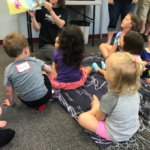by Beverly Smith, Kindermusik mom
As the mom of a toddler I often get asked if my daughter is in any activities. I always tell them, first and foremost, that she has gone to Kindermusik at Music Connections Foundation since she was a baby, and absolutely loves it! Several times I’ve been asked, “What is Kindermusik?” To me, Kindermusik is a lot of different things, so it’s hard to explain in just a few words. Most simply put, though, Kindermusik is a developmental music program. Every activity has both a developmental and a musical goal; and it’s research-based. There have actually been studies done using the Kindermusik curriculum that show drastic increases on intelligence tests over the non-Kindermusik “control” group. One study with preschoolers showed 32% higher gains on the PALS tests (for language and literacy assessment).
Kindermusik addresses a lot of different skills important to children as they grow, but it’s done under the “guise” of play and fun, which is the best way for children in early childhood to learn. In what seems like a short amount of time (a 45 minute class), the following are addressed: gross motor skills, fine motor skills, social and emotional skills, early language and literacy skills, musical development and many important life skills. Teachers in class help us, as parents, understand how the musical activities are fostering these skills. But it’s like “broccoli hidden in ice cream” - what’s best about Kindermusik is that children don’t know that they are learning, and have an amazing time interacting with their parent or caregiver, other children, and the teacher, in joyful song, dance, instrument play, music and movement storytime, and more.
As a former teacher, I know the importance of both social skills and learning how to cooperate in the classroom. My daughter has learned so many of these skills in her Kindermusik classes. As a two year old, she knows how to sit at a rug or carpet for short periods of time and attend to a story being read aloud. She’s also learned to take turns, share, clean up after an activity, follow the lead of a teacher, answer questions, and interact with other kids her age. Her listening skills have vastly improved through a routine in class called “active listening:” they help us “turn on” our ears by rubbing them from top to bottom (to wake up the sensory nerves in the ears) and then use the sign language for “listen” so the children know they are making a choice to listen; we listen to sounds of animals, vehicle noises, instruments, even babies crying or laughing. Story time is another chance to practice active listening; my daughter’s love of books, music, and instruments continues to vastly grow as we have the chance to repeat the experiences from in-class using our home materials (the stories, all of the music and interactive digital activities.)

There are so many music skills she’s exposed to from class. She’s learned how to play several percussion instruments and she’s been exposed to several different wind and string instruments. Lately, she’s begun to sing along to songs in class and at home. The early language of music she’s been exposed to has been great, too. She’s learned to hear opposites of loud and quiet, high and low, and the terms of pitch, beat, rhythm, timbre and more. She knows how to keep a steady beat while clapping, playing percussion instruments, and patting her lap with her hands. By the way, steady beat is not just a musical skill! Research shows that kids who can keep a steady beat are better scissor-cutters, ball-bouncers and even walk with more self confidence - just another tidbit I learned in Kindermusik!
She’s also fostered so many fine and gross motor skills in class, like clapping, hopping, galloping, jumping, dancing, tapping toes, catching a ball, and more. I know I’m biased, but for a two year old her motor skills are amazing! The activities in class have increased her ability to do so many things. She plays instruments, plays with manipulatives in class like puppets, scarves and small toys, all while doing movements to a song. After all the practice she’s received through class and play at home, she can now cut with scissors and she’s beginning to write with pencils.
The part I love most about our Kindermusik program is that they give every kid this opportunity, whether or not they can afford to pay full price. The philosophy at Music Connections Foundation (our local Kindermusik program) is that every child deserves the chance to learn, grow and thrive through early childhood music. To that end, they offer scholarships and programs within the community to help kids who are at-risk, have special needs and those from all backgrounds.
It’s amazing to think how our time each week is impacting my daughter’s growth. It forces me, too, to stop and experience one on one time with my child that I know will make a difference in her for life! In this fast-paced busy world, I’m grateful for that chance, and that I am able to give her the opportunity to attend Kindermusik.
